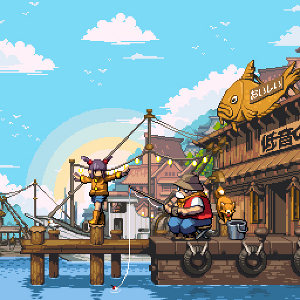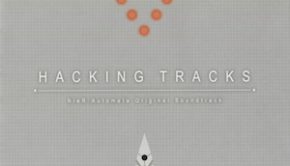Equilibrium
 |
Album Title: Equilibrium |
| Record Label: Ubiktune |
|
| Catalog No.: UBI023 |
|
| Release Date: April 27, 2011 |
|
| Purchase: Download at Bandcamp |
Overview
In 2011, nine talented chiptune artists brought us Equilibrium, an original indie album inspired by the sweeping soundscape of Japan. The gorgeous retro-styled pixel art cover was enough alone to convince me that I was in for something great. And the music certainly delivered too. Featuring the likes of popular chiptune composers such C-jeff, Blitz Lunar, and surasshu, the album was a real treat for the ears.
Body
“Omoide No Furusato (lit. Hometown of Memories)” from Kulor opens up rather simply, with electronic blips and a melancholic melody. The sounds of waves can be heard in the distant, perhaps symbolizing that we’re on a fisherman’s boat as he sets out before the vast aquatic scenery before him. Despite the melody not having a set direction, the track provides great atmosphere and its accessible nature makes it all the more enjoyable. Blitz Lunar’s “Sapling” is structured similarly as well, but the differences in compositional style keep it from feeling too familiar. Like before, it starts with simplistic chiptune synth, but the airy melody soon develops into a more sonorous sound.
Things become more intense with “Poseidon.” The synth is dire, and the melody is dark and foreboding. At about halfway through, the tempo increases. The waves have become stronger, and the fisherman is now being swept away in a terrible storm. When he awakens, we enter “Waves to Lullaby.” The track is serious in nature, reflecting on the gravity of the situation. The fisherman scans the surrounding area. He sees a far-off island in the distance. “Maroon” by Ubiktune founder C-jeff bears the composer’s signature progressive funk style. The atmosphere feels tense and desperate, but bluesy as well. Our fisherman is stranded on the island, but he vows to not give up.
RushJet1’s “Calming Winds” takes place after the storm. The fisherman looks around at the island and sees that it’s a lush paradise. The chiptune melody becomes more focused, and the castaway repairs his boat with various pieces of drift wood. The Asian-inspired “Donna Kukyou Demo Akiramezu (lit. Did not give any predicament)” deals with the fisherman’s plan for escape. Taking out his sea charts and compass, he plots a course to get back home. The return journey is long and hard, but he works through it all.
“Recovery” is more laid back and upbeat; symbolizing that the fisherman’s travels have come to an end. After many days of voyage, the fisherman finally sees his home island in the distance. The sun is slowly setting and he is fatigued with exhaustion, but is satisfied that he was able to return home safely. The melody feels vague and mysterious; but also hopeful as well. He is welcomed back by the villagers who long thought him to be lost at sea, as the theme becomes more emotional. surasshu’s nostalgic track “Rebirth” feels like an epilogue to the overall story. Years have passed, and the fisherman is much older. He tells his experiences to all that will listen. Although he has long since retired from such daring adventures, he passes down his stories to the villagers so he will always be remembered.
Summary
And there you have Equilibrium. Although the album bears a modest runtime and perhaps will feel too simplistic to some, I see it as an excellent aural story that is crafted by expertly composed chiptune music. Obviously this won’t change anyone’s mind if they’re not a fan of the genre, but chiptune fans will definitely find this a worthwhile listen. If you want to sit back and relax for half an hour of soothing atmospheric music that’s a throwback to Japanese tones and classic NES soundtracks, go over to Bandcamp and download this one at the price you name.
Do you agree with the review and score? Let us know in the comments below!
4
Posted on May 19, 2014 by Oliver Jia. Last modified on May 19, 2014.














